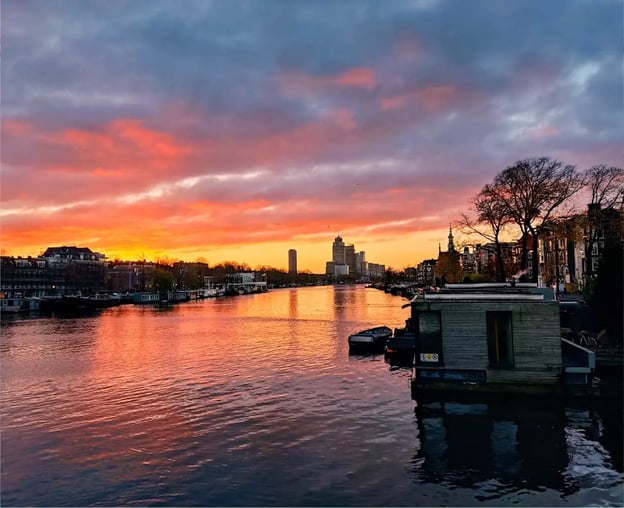Have you ever thought about how time can seem to pass at different speeds?
Do you remember the last time you woke up, traveled to a beautiful place and basked in the sun? Even if this experience only lasted a few hours, it energized you for a week and was more memorable than the same amount of time spent in your usual routine – if you haven't tried this lately, it’s time to remind yourself.
During just one week in Amsterdam, we encountered a diverse range of experiences that made time seem to expand magically. It was as if we had stepped into the shoes of Sherlock Holmes, using time for discoveries.
Table of contents
Part 1: Solo, Duo, Trio
Aylin and I work together in the Connectivity tribe at Mews, where our primary focus is the connectivity of our hospitality platform. This enables hoteliers to connect their crucial external systems, such as processing reservations through connections to CRS, OTAs, etc., and manage their business from a single unified platform.
Building something like this is challenging for a solo thinker, even with the best intentions. That's why, in addition to tapping into the collective intelligence of our remarkable team, we actively engage with our partners and customers.
As part of a Product Trio, our responsibility is to build the product roadmap within our domain. We ensure that it’s feasible and resonates with our clients, offering them value and a product they genuinely love – and that we can realistically build.
I’m an engineering manager (EM) and Aylin is a product manager (PM). During our journey, we were joined by our product designer, Iryna, based in the lively heart of the Netherlands, and Laura, another PM from our tribe (yes, even in a remote-first company, we believe in-person meetings can matter). As a team, we enhanced our collective strength and the scope of our research, allowing us to ‘multitask’. For example, while some of us were visiting technology partners, others engaged with hoteliers. Later, we reconvened to discuss our findings.
Part 2: Discovery
There's no secret formula here. But again, picture Sherlock Holmes, sneaking around with a magnifying glass, determined to find that final piece to validate your assumption...
The same principle applies in software development. After the initial preparation of gathering data and refining ideas, the next step is to validate them with customers.
Engaging with customers offers various options:
- Quickly collecting feedback through a 20-minute Zoom meeting
- Efficiently scaling up using a questionnaire, or
- Stepping into the hotel lobby, feeling the environment, and truly grasping the unique concepts of different hotels (and discussing it over a nice cup of coffee).
While all these approaches contribute to the overall puzzle, what tends to leave a lasting impression is the face-to-face interactions.
Learning opportunities
As you enter a hotel and engage with its staff, you gain insights into its philosophy.
Some aspire to be cutting-edge leaders, embracing online check-ins, mobile keys, widespread integrations, and an experience where guests interact minimally with receptionists. Others prioritize being genuine hosts, creating an environment where returning guests truly feel at home, relaxing in an antique armchair.
What’s cool about the hospitality industry is that every concept has different guests, as there is no one-size-fits-all solution.
In our discussions with numerous hotels, we explored their preferences, pain points, and innovative ideas to introduce to Mews. This process allows us to validate the relevance of our plans and determine if they genuinely matter to our partners and which segment they cater to.
The feedback process may be intense, but it allows you to evaluate potential concerns with your team or partners, enhancing the product's relevance and usability. As a bonus, you'll likely receive feedback about your product beyond what you initially asked for. This feedback can be valuable for passing on to the appropriate team to help enhance and shape the product.
Part 3: Booking.com conference
There are various ways for guests to find the right hotel. One of them is to use online travel agencies, like Booking.com, to discover a place to stay.
As we offer a direct connection to Booking.com, we were invited to their conference for close partners.
While we can't divulge much about the presentation, it primarily centered around sharing roadmaps and opportunities to become early adopters of new concepts. Besides discussions about UI topics, it also explored key concepts like modern API design and security/observability. It was also interesting to learn about their strategies for supporting existing connections while innovating to remain a vital player that aligns with modern standards in helping customers.
Attending these types of conferences is not just about listening; it's an opportunity for you to provide feedback on features and topics that matter to you and network with other partners.
There will also be some small memories that stick with you, such as fantastic food in the canteen, interactions with diverse individuals – whether visitors or employees – and perhaps even some funny moments (please don’t ask me about walking into doors).
I also learned that organizing and hosting such conferences is not an easy task. However, it’s worthwhile because the feedback and collaboration from all participants play a crucial role in shaping meaningful developments in the industry.
The magic of '1+1>2'
Why do people travel? Everyone has their reasons, but what’s most important for me is that it broadens our perspective, enriching our mindset with exciting memories.
In our journey, we discovered that the Dutch are great cyclists who always look elegant and are not afraid to cycle through construction works. And then there were the various delicious foods and the taste of great coffee. These are perks alongside the core mission.
When interacting with customers and partners, there’s bound to be something that adds value to your work. And because you don’t know what you’ll encounter in advance, it makes the experience even more enjoyable. If you’re worried that your short trip won't make an impact, try to suspend those fears: you'll never know until you try.
Awaken your inner Sherlock. Engage your brain, pay attention to the details, and use your analytical skills to understand the lessons learned. Then, you can build products that truly matter, and rest assured that this, blended with your emotions, will lead you to an even more remarkable journey.

2026 Hospitality Industry Outlook
Download now
Table of contents
Hospitality hot takes straight to your inbox



.webp)